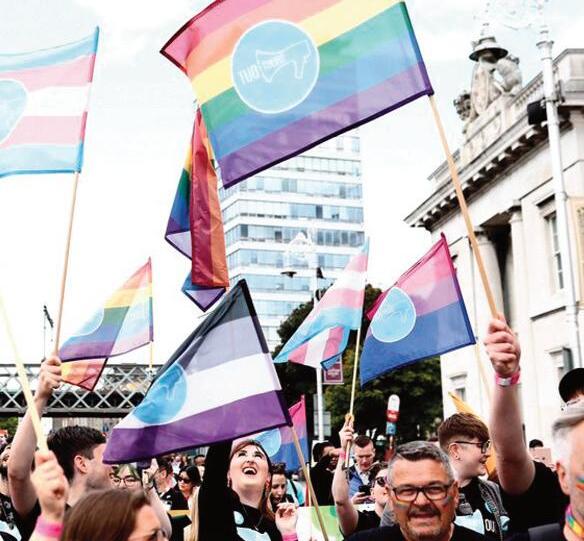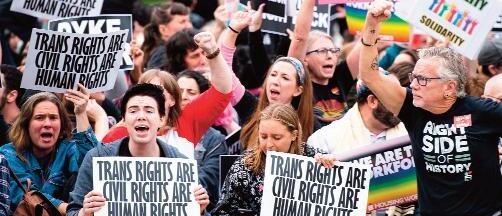
4 minute read
bia : p ty The ‘rainbow capitalism’ lie: Why LGBTQphobia is part of the system wave of backward bills attack LGBTQ rights
By Conor Payne
AS ALWAYS, this Pride Month we will see major companies putting out Pride-themed advertising, changing their social media profiles and putting out anodyne statements about inclusivity. On one level, this is a fairly simple attempt to cash in on Pride, a tradition whose real roots are in the struggle of the LGBTQ+ community for equality. At the same time, it also reflects a deeper trend – sometimes called ‘rainbow capitalism’ –whereby LGBTQ+ rights are used to try to launder the reputation of an increasingly discredited system.
Nearly every Pride event will be packed with mega corporations and establishment politicians, many of whom only became ‘allies’ of the queer community after our movements had already succeeded in winning increased legal rights and public acceptance. Of course, the ‘freedom’ offered by rainbow capitalism doesn’t mean much for trans people who can’t access healthcare; for LGBTQ+ young people who can’t escape unsafe family situations due to the housing crisis; or to refugees who face deportation to countries where they will be persecuted for who they are.
Right-wing backlash
on the basis of equality, including gender equality, and sexual freedom. The development of class society and a propertied elite brought with it the systemic oppression of women and enforced heterosexual family structures as a means of securing a line of inheritance for accumulated wealth. With the development of capitalism, the idealised nuclear family was the sphere where women would do the unpaid domestic labour necessary for the reproduction of the system — including child rearing, cooking and care work – while in the capitalist workplace women could be exploited as a low paid section of the workforce. This is not just history – capitalism still relies on the oppression of women today. While the traditional nuclear family has been weakened in certain ways, capitalism still relies on the idea that care and domestic labour are private responsibilities rather than the concern of the whole community. The value of women’s unpaid labour is estimated at nearly $11 trillion a year globally.
We need a new movement to fight back against this wave of attacks ond floor of the Tennessee General Assembly building in Nashville.
Resistance needed
These bills, the proponents behind them, and the ideology they are pushing are deeply backward. Under the guise of “protecting children”, what they really want to do is erase queerness. It isn’t a coincidence that the same people wanting to ban discussion around queerness in schools also oppose samesex marriage. It isn’t a coincidence that the people who want to deny bodily autonomy to trans people also want to deny it to cis women and girls. It isn’t a coincidence that the people who want to ban drag shows also want to ban Muslims. There isn’t a more effective way to dehumanise and villainise an entire demographic of people than to push the narrative that not only should children not be around them, but children also shouldn’t know they exist. These people don’t even want gay adults to be allowed to marry, and they find the trans community so undesirable that they literally want to make their lifesaving medical care a crime. This weaponisation of public policy has been driven by extremist groups that have a long history of working to oppress the existence and rights of the queer community. But it is happening in the context of a more generalised pushback against gains that have been made in recent years, and it is finding an echo even among some of the supposedly more re- spectable or liberal sections of the political and media establishment.
We need a new movement to fight back against this wave of attacks; one that returns to the radical traditions of the early LGBTQ movement. This means one from below based on queer people, young people and working-class people, with no reliance on the establishment, liberal or otherwise, which has never seriously fought for or defended our rights. This is urgent, and it’s a global issue. If we don’t fight against it right now, as it is happening, it will mean the next generation will have to fight the same battles we did, but more crucially, these bills will have a chain reaction that will result in the loss of life for countless queer youth.
The difference now is that under this system we are not seeing steady progress for LGBTQ+ people but the opposite – a growing right-wing backlash which targets us all, and in particular the trans community. The capitalist media, politicians and an emboldened far right are pushing a moral panic based on fear and misinformation about trans people, drag queens and the ‘indoctrination’ of children. This is part of a broader right-wing backlash which also targets migrants, the global feminist movement and the left. It's a strategy not just to reverse the achievements of movements of oppressed people, but to stabilise an increasingly crisis-ridden capitalism around an authoritarian programme.
In this context, we will see more and more the shallowness of the commitment of capitalism to LGBTQ+ rights, e.g. Target, a major retailer in the US, which has removed Pride merchandise from its shops in response to an right-wing campaign of pressure. Its not just that capitalism isn’t a route to real liberation – there are reasons why this system continually gives rise to homophobia and transphobia. They are in its DNA.
History of gender oppression
Early human societies were organised
It’s not possible to maintain a setup like this without an ideology of rigid gender norms, or without the social control of gender and sexuality. Queer people are targeted because they exist outside these idealised conceptions of masculinity and femininity and the nuclear family structure. Capitalist societies have, in general, subjected LGBTQ+ people to criminalisation, pathologisation and stigmatisation. Backward ideas about gender and sexuality have been transmitted in capitalist society by some of its key institutions, including religion, the media, the education system and the state.
Socialist struggle for liberation
In recent decades, the struggles of LGBTQ+ people themselves have won significant progressive changes, and also had a huge effect on the attitudes of ordinary working-class people, although of course homophobia and transphobia remain part of daily life even in the most ‘progressive’ capitalist countries. However, capitalism itself has not been altered fundamentally and this system in crisis is now dredging up every prejudice in order to tie working-class people into its continued rule.
It’s no surprise that many LGBTQ+ young people are convinced that to really achieve liberation we need to end this system and fight for an alternative. That alternative is a socialist society based on equality and solidarity, where wealth is taken from the hands of the capitalist elite and controlled democratically for the needs of all.










